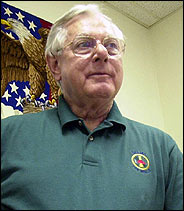joseph thomas smitherman
 Joseph
T. Smitherman, who in more than 35 years as mayor of Selma, Ala., went
from ardent support of segregation at the time of the notorious 1965
beatings there to pride in his backing among blacks, died on Sunday in
Montgomery, Ala. He was 75.
Joseph
T. Smitherman, who in more than 35 years as mayor of Selma, Ala., went
from ardent support of segregation at the time of the notorious 1965
beatings there to pride in his backing among blacks, died on Sunday in
Montgomery, Ala. He was 75.No specific cause of death has been determined, said Jackie Checkler, a manager at Lawrence Brown Service Funeral Home in Selma. The Associated Press reported that he was recuperating from hip surgery and had heart problems.
Mr. Smitherman's career followed what became a familiar trajectory for some white politicians, with long-lasting success. After blacks won voting rights, he appointed many blacks to high municipal positions. He frequently spoke of his ability to get votes from blacks; established amicable relations with civil rights leaders like John Lewis, now a Georgia congressman; and made former scenes of strife into tourist attractions.
Mr. Smitherman was sworn in six months before what became known as Bloody Sunday, March 7, 1965, when marchers seeking equal voting rights were beaten by sheriff's deputies and state troopers on the Edmund Pettus Bridge in Selma. The revulsion felt by many Americans who witnessed the beatings on television galvanized support for the Voting Rights Act, which President Lyndon B. Johnson signed into law on Aug. 6, 1965.
The new mayor is sometimes viewed as a moderate for 1965, despite his support of segregation. He was outside the circle of Judge James Hare, the local circuit judge, who gave marching orders to the virulently racist Sheriff Jim Clark in the confrontation. Mayor Smitherman's political ally Gov. George C. Wallace sent in state troopers, who combined with the sheriff's posse to use tear gas, nightsticks and electric cattle prods to halt marchers.
Mayor Smitherman ordered his police to join the state and county authorities in using force against demonstrators, but his public safety director, Wilson Baker, refused to do it. City Council members brokered a compromise under which the city police would not join the melee, but also would not prevent protesters from marching into the armed force.
In a nationally televised news conference in early 1965, the mayor was heard replacing the last name of the Rev. Dr. Martin Luther King Jr. with the word "coon." He later said he had just had a conversation with a Selma bail bondsman named Martin Koon and that it was an honest slip of the tongue.
He said that political imperatives forced him to hide what he said had always been tolerant racial feelings.
"I fought change and all the while I was for it," he said in an interview published in The Selma Times-Journal yesterday. "A political stance is often different from your personal beliefs."
Mr. Smitherman was born on Dec. 23, 1929, in Alberta, Ala., the youngest of six children. The family soon moved to Selma. After graduating from high school, he worked as a railroad brakeman, then served in the Army during the Korean War. He returned home and sold appliances, eventually becoming owner of the Home Appliance Company.
He won a seat on the Selma City Council in 1960 and four years later was elected mayor. He soon had to confront a gathering racial crisis and called in local black leaders as Dr. King was about to arrive. The mayor urged the leaders to demand that he pave streets in their neighborhoods. According to David Halberstam's book "The Children" (1998), he planned first to refuse, then under mounting black pressure, to give in. "That would give them victory which would prevent King from coming to town," Mr. Halberstam wrote. The circuitous plan was never put into effect.
The New York Times reported that a month before Bloody Sunday, Mayor Smitherman rejected a suggestion by visiting congressmen that he appoint a biracial commission of reconciliation. He said Selma could do without outside agitation and intervention.
In later years, the mayor repeatedly won re-election with overwhelming white support and enough black votes. Among his achievements was rejuvenating Selma's downtown, partly by backing preservation projects. He fought successfully to roll back a utility's power charges and to force a railroad to repair unsafe tracks.
In the 2000 election, James Perkins beat Mr. Smitherman 57 percent to 43 percent to become Selma's first black mayor.
Mr. Smitherman is survived by his wife, Erika; his daughter, Ouida Dianne Smitherman; his son, Stephen Gillis Smitherman; his sister, Helen D. Dudley; five grandchildren; and one great-grandson.